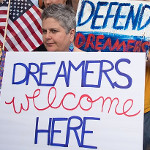 Employment and labor law firm Littler has released the results of its seventh annual survey, completed by 1,111 in-house counsel, human resources professionals and C-suite executives. The Littler Annual Employer Survey, 2018 analyzes the impact that sweeping regulatory changes and other factors, including the #MeToo movement, are having on employers.
Employment and labor law firm Littler has released the results of its seventh annual survey, completed by 1,111 in-house counsel, human resources professionals and C-suite executives. The Littler Annual Employer Survey, 2018 analyzes the impact that sweeping regulatory changes and other factors, including the #MeToo movement, are having on employers.
The firm summarized its findings:
Following a year that brought several changes to workplace policy, the survey shows employers feeling some regulatory relief with the change in administration, while cautiously anticipating less of an impact from key regulatory issues over the next year. The portion of respondents expecting a significant impact from the Affordable Care Act dropped from 33 percent in the 2017 survey to 15 percent in 2018, with similar drops in significant concern around enforcement by the U.S. Department of Labor (25 percent to 16 percent) and the National Labor Relations Board (13 percent to 8 percent).
At the same time, employers feel buffeted by the burdens created by abrupt and dramatic regulatory changes, slow-moving confirmations to key government agency positions and the growing patchwork of state and local labor and employment requirements. The majority of respondents (64 percent) said that reversals of workplace policies and regulations between presidential administrations put a strain on their businesses and 75 percent said they faced challenges as states and localities work to fill perceived policy vacuums at the federal level.
“Companies want certainty more than anything,” said Michael Lotito, co-chair of Littler’s Workplace Policy Institute. “The vast majority of employers want to comply with the law and the continuous reversals of federal workplace policy, as well as the increasingly fragmented and sometimes contradictory rules at the state and local level, is an enormous distraction for them. Uncertainty means inability to plan, budget and anticipate, and it requires constantly retraining employees and reformulating employment policies.”
Of the changes that occurred during the first year of the Trump administration, respondents identified the rollback of wage-and-hour policies (62 percent) and the new tax bill (62 percent) as the areas that have most significantly impacted their businesses.
Immigration Reform Focuses on Visas and Enforcement
Amid tightening regulation and enforcement of both legal and illegal immigration, employers expect a range of immigration-related changes to significantly impact their workplaces over the next year.
Tighter restrictions on visa adjudications, such as those for employees with specialized skills and temporary workers, was the top concern selected by 48 percent of respondents. More than a third (36 percent) expressed concern with increased workplace immigration enforcement by U.S. Immigration and Customs Enforcement and associated agencies.
“It’s not surprising that the visa process and immigration enforcement emerged as employers’ top concerns,” said Jorge Lopez, chair of Littler’s Global Mobility and Immigration Practice Group. “The increased scrutiny being applied to employment visas and rule changes impacting visa programs, which often come mid-stream and without prior warning, make it difficult for employers to plan ahead and manage their workforces. In addition, the increase in worksite enforcement and raids have naturally heightened employers’ focus on worksite compliance issues and properly addressing those concerns.”
Continued Workplace Discrimination Enforcement Expected Amid Focus on Harassment
The survey showed virtually no change in the impact employers anticipate from enforcement by the Equal Employment Opportunity Commission (EEOC) over the next year, with 76 percent anticipating an impact in the 2017 survey and 77 percent in 2018. This aligns with a key finding from Littler’s Annual Report on EEOC Developments – that the Commission actually filed more lawsuits in fiscal year 2017 than it has since 2011.
Employers surveyed expect the EEOC’s top enforcement priorities in the near-term to be harassment claims (64 percent), hiring practices (53 percent) and retaliation against employees who file discrimination or harassment claims (48 percent).
“Employers are right to expect the EEOC to continue to vigorously investigate workplace discrimination claims, particularly harassment claims and other EEOC priorities, regardless of upcoming changes at the Commission with an expected new chair, commissioner and general counsel,” said Barry Hartstein, co-chair of Littler’s EEO & Diversity Practice Group. “With the #MeToo movement and the EEOC’s focus on stemming the tide of harassment in the workplace, taking steps to minimize the risk of harassment claims should be a top priority for employers. We also should expect an active plaintiffs’ bar threatening and initiating private lawsuits during the coming year based on these developments.”
Sexual Harassment and Pay Equity Rank as Top Concerns for Employers
Among the many headline-grabbing issues swirling through the workplace, the majority of survey respondents (66 percent) ranked sexual harassment as the most or second-most concerning issue on their radar.
In the wake of the cultural shift sparked by the #MeToo movement, 55 percent of respondents have added training for supervisors and employees, and 38 percent have updated human resource policies or handbooks. However, only 13 percent have implemented new tools or investigation procedures to manage employee complaints and 24 percent have not made any changes over the past year.
“No company can afford to ignore this issue, and while many already have a good foundation, the past several months have shown the importance of reevaluating and reinforcing policies and procedures,” said Helene Wasserman, co-chair of Littler’s Litigation and Trials Practice Group. “While the law governing harassment in the workplace hasn’t changed much, employee expectations have. In addition to providing training and updating policies, it’s critical that companies have effective complaint procedures in place and that employees feel confident that reports of potential misconduct will be taken seriously and acted upon.”
Gender pay equity followed sexual harassment as the second-most concerning issue in the headlines for employers, with 41 percent placing it among their top two concerns. Companies reported taking action as a result, including conducting audits of current pay practices and salary data (61 percent) and revising hiring practices, such as updating job applications and ceasing the practice of asking candidates about prior salaries (34 percent). However, only 14 percent have modified compensation policies or taken steps to facilitate advancement of female and minority employees.
“Conducting audits is a critical first step to identifying pay disparities among employees, but with continued attention to this issue and an evolving legal landscape, an audit is just the beginning of addressing pay equity in the workplace,” said Denise Visconti, a shareholder heading the Littler Pay Equity Assessment. “As time goes on, pay disparities only become more intractable, so proactively addressing this issue helps companies mitigate risk and reinforce their commitments to treating employees equally and fairly.”
Employers Start to Embrace Data Analytics and Artificial Intelligence
Recruiting and hiring is the most common use of advanced data analytics and artificial intelligence, adopted by 49 percent of survey respondents. Employers also said they were using big data to guide HR strategy and employee management decisions (31 percent), analyze workplace policies (24 percent) and automate tasks previously performed by humans (22 percent). The smallest group of participants (5 percent) are using advanced analytics to guide litigation strategy.
“It is encouraging to see employers starting to embrace the many benefits provided by big data in helping manage their most important asset, their people,” said Aaron Crews, Littler’s Chief Data Analytics Officer. “However, it appears that many employers are not aware of the significant potential to use advanced data techniques to guide litigation strategy. The ability to leverage data early in a case, to tease out insights before you ever take a deposition or begin evaluating the credibility of witnesses, is revolutionary.”
The survey results are being released at Littler’s 35th annual Executive Employer Conference taking place May 2-4, 2018, in Phoenix, Arizona.




